Bali 2002 TV series: Richard Roxburgh and Claudia Jessie on recreating trauma
There are always questions as to whether you should retell a story rooted in great trauma.
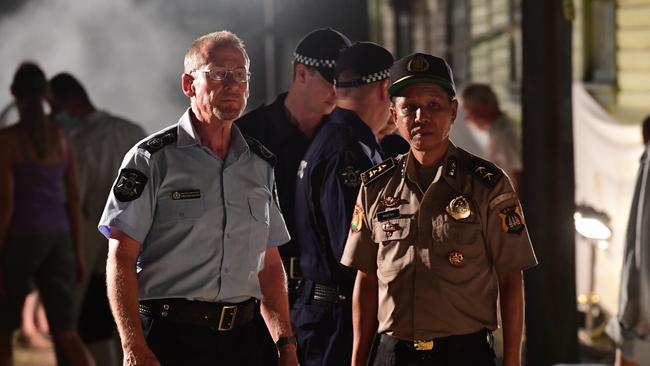
TV
Don't miss out on the headlines from TV. Followed categories will be added to My News.
The air was thick with humidity and the smell of incense. All around, burnt-out 90s model sedans littered the street.
A crushed car bonnet, a blown-out window. Everything was charred and blackened.
To one side, the carcass of a building, seemingly decimated by violence. Rubble and shrapnel crunched beneath feet while the grey skies above threatened to open, as it had on-and-off all afternoon.
Actor Richard Roxburgh was working through a scene, dressed in a policeman’s uniform, the navy epaulets on his shoulder embroidered with official-looking insignia.
But as the rain started to fall, his blue shirt and glasses were spotted with tell-tale drops. Someone yelled “cut” – the water stains were going to be too troublesome for continuity.
The staged scenes of disaster and terror were for the four-part Bali bombings miniseries, Bali 2002. We were not in Bali, but on a usually empty lot in Rosehill, a Sydney suburb 22 kilometres west of the CBD known primarily for its racecourse.
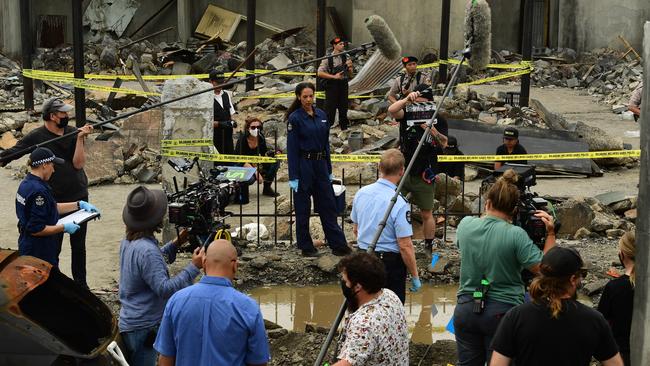
The goal was to make it took like Bali, but without leaving the country. It was early 2022 and filming in Bali was too much of a logistical challenge thanks to years of pandemic lockdowns. Of course, filming in Sydney during months of La Nina-fuelled storms was its own burden.
While no one in the production says it, maybe it was also easier to shoot in this isolated spot in Sydney given the sensitivities around any project which revisits a horrific historical event.
When the dual bombs exploded in Bali in October 2002, 202 people were killed, including 88 Australians.
Twenty years after the event, the emotions are still raw and there will always be questions over whether screen portrayals are purely exploitative entertainment or if they add something to our understanding of national trauma and human resilience.
Bali 2002 wasn’t the first Bali bombings project Roxburgh was attached to. In 2005, he was to star in another screen title about the terror attack, to be directed by Michael Jenkins. He had even flown into Bali to start work but it fell apart.
It was to be a different character to the one he’s playing now, AFP commander Graham Ashton.
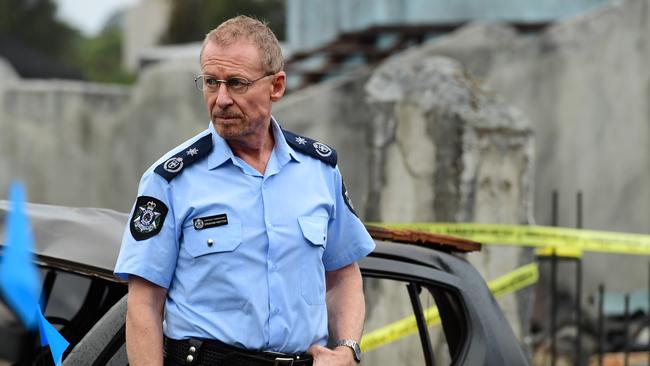
“I got promoted,” Roxburgh told news.com.au.
Roxburgh was drawn to the story of the real-life Ashton who spearheaded the Australian investigation on the ground in Bali, working closely with his Indonesian counterparts to forge a strong coalition between two scarred nations.
Roxburgh sees the value of telling this particular aspect of the story, of how relationships can deepen the wake of tragedy.
“It’s about the beautiful things that came from it,” he said. “People reaching across cultural divides to do something, a complex police operation that was unprecedented in Australian history.
“It was a very complex operation but there was also the diplomacy that had to happen to make sure that [the investigation] could flourish, and then there was also dealing with a lot of grieving Australians.”
Roxburgh didn’t meet Ashton in person due to covid restrictions but he spoke with the former officer at length. The actor said he was impressed by the man, especially he had previously mostly played cops who were less-than-exemplary, notably the corrupt and murderous Roger Rogerson.
In Ashton Roxburgh was blown away by the breadth of Ashton’s skills. Ashton had been stationed in Indonesia previously and was attuned to the cultural sensitivities of the place, and spoke Bahasa Indonesian.
“H was a unicorn figure to have in the AFP at that time.”
Roxburgh wanted to be certain that the Indonesian side of the story would also be surfaced and on that count, he was “satisfied that was the case”.
“I thought there was some really beautiful threads throughout about the complex cultural coming together, and in a large sense, that’s what the series is about.”
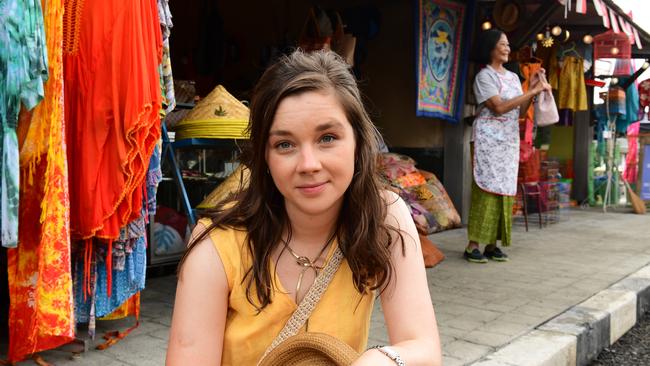
For English actor Claudia Jessie, she acknowledged that Bali 2002 is likely to be “incredibly painful” for a lot of people to experience.
But the key was to respect the story and those people involved, including the real-life survivor she played in the series, Polly Miller.
“Stories like this mean so much to people and this show isn’t here to exploit such a huge and painful thing,” Jessie said. “It’s really a beautiful piece showing strength and resilience, and commemorating the heroes who lost their lives in this tragic event.
“And those who survived. It’s about compassion and altruism.”
Jessie said she wanted to portray Miller as someone who is wonderful and funny, with an amazing, dry sense of human, someone magnetic with a thirst for life. She and Miller spoke for hours and emailed each other pictures or even just gabbed about what they were both watching on TV.
In some ways, knowing Miller made the work harder for Jessie. “I want to make sure that I do it justice because she’s wonderful. You want to show respect to the people that were affected by this and that’s been very present in my mind the entire time I’ve been doing this.”
When Jessie shot the scenes directly following the explosion, as she crawled through the makeshift Sari Club erected in that empty lot in Rosehill, she was overcome with emotion.
“Crawling through the debris, we did one take and they called cut and I just burst into tears. There are all these [extras] around me, everything’s on fire, people are screaming, I’m crawling through gravel and covered in blood and prosthetics.
“It’s a lot but it’s good because we are doing it right. It’s something to be proud of.”
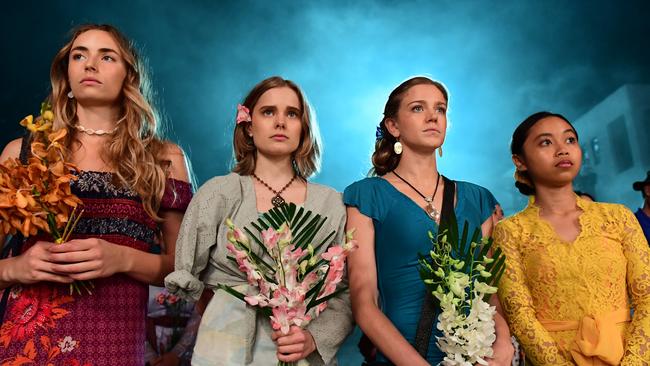
Roxburgh said he had to trust that Bali 2002 wouldn’t be exploitative or existed purely for entertainment purposes.
“I thought it was there in the writing, otherwise I wouldn’t have felt comfortable doing it. That’s the leap of faith.”
Bali 2002 is going to be a hard watch for many people, including many Australians still reliving the trauma of that earth-shaking tragedy. Which swings back to the question of what is the purpose of recasting a catastrophe?
“These are stories about how people survived, how they’re forged in great difficulty. Some of the most horrifying things that can happen to you are the things that go on to become the instruments of who you are.
“It completely reframes you as a person. But in surviving it, it pounds the very structure of your being and creates these extraordinary human beings.”
Roxburgh was talking about the individual survivors the four-part miniseries follows, but it could easily apply to Australia and Indonesia.
“These are stories worth telling, even though they’re hard.”
Bali 2002 is streaming now on Stan
Originally published as Bali 2002 TV series: Richard Roxburgh and Claudia Jessie on recreating trauma



